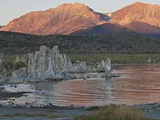|
|
TODAY.AZ / Weird / Interesting
Clue to Alien biology found on Earth's doorstep
03 December 2010 [19:26] - TODAY.AZ
 Life, but not as we know it, has been discovered on Earth, raising the chances of alien biology evolving on other planets. The discovery is said to have huge implications for the search for extraterrestrial life. Scooped from mud at the bottom of a Californian lake, the microbes have been described as a form of "weird life" by scientists.
Life, but not as we know it, has been discovered on Earth, raising the chances of alien biology evolving on other planets. The discovery is said to have huge implications for the search for extraterrestrial life. Scooped from mud at the bottom of a Californian lake, the microbes have been described as a form of "weird life" by scientists.The bugs are able to thrive on arsenic, one of the most deadly substances known to most organisms, and even incorporate it into their DNA. Arsenic usually disrupts metabolic pathways, making it impossible for the normal mechanisms of life to continue.
But the strange microbes not only survive in an arsenic environment butincorporate the chemical it into their DNA.
When scientists talk about life they tend to mean "life as we know it" - that is, life based on the biological building blocks found on Earth. But some experts have speculated that there may be alternative kinds of life - dubbed "weird life" - elsewhere in the universe.
The new find lends support to that theory, increasing the prospects of discovering life on Mars or the moons of Saturn or Jupiter, or outside the Solar System.
Dr Felisa Wolfe-Simon, from Arizona State University, who led the US researchers, said: "Our findings are a reminder that life as we know it could be much more flexible than we generally assume or imagine.
"If something here on Earth can do something so unexpected, what else can life do that we haven't seen yet? Now is the time to find out."
All "known" life requires six fundamental elements - carbon, hydrogen, nitrogen, oxygen, phosphorous and sulphur - which provide the building materials for DNA, proteins and fats.
Phosphorous, normally obtained from inorganic phosphate, is a key member of this group and found in many of the components of cells. Without it, life should not be able to exist.
But the bugs studied by Dr Wolfe-Simon's team have the extraordinary ability to swap phosphorous for arsenic. The microbes were grown in laboratory dishes in which phosphate salt was gradually replaced by the toxic element.
In the end, the bacteria were able to grow without any phosphorous at all.
/Sky News/
URL: http://www.today.az/news/interesting/77644.html
 Print version
Print version
Views: 2544
Connect with us. Get latest news and updates.
See Also
- 19 February 2025 [22:20]
Visa and Mastercard can return to Russia, but with restrictions - 05 February 2025 [19:41]
Japan plans to negotiate with Trump to increase LNG imports from United States - 23 January 2025 [23:20]
Dubai once again named cleanest city in the world - 06 December 2024 [22:20]
Are scented candles harmful to health? - 23 November 2024 [14:11]
Magnitude 4.5 earthquake hits Azerbaijan's Lachin - 20 November 2024 [23:30]
Launch vehicle with prototype of Starship made its sixth test flight - 27 October 2024 [09:00]
Fuel prices expected to rise in Sweden - 24 October 2024 [19:14]
Turkiye strikes terror targets in Iraq and Syria - 23 October 2024 [23:46]
Kazakhstan supplied almost entire volume of oil planned for 2024 to Germany in 9 months - 23 October 2024 [22:17]
Taiwan reported passage of Chinese Navy aircraft carrier near island
Most Popular
 Azerbaijan launches industrial copper mining: Demirli opens up new opportunities
Azerbaijan launches industrial copper mining: Demirli opens up new opportunities
 Armenia is reforming the army: revanchists are worried
Armenia is reforming the army: revanchists are worried
 Azerbaijan launches desalination of Caspian water - innovations and international experience
Azerbaijan launches desalination of Caspian water - innovations and international experience
 Fuel shortage has hit Yerevan - what prevents it from turning to Azerbaijan?
Fuel shortage has hit Yerevan - what prevents it from turning to Azerbaijan?
 Armenia takes control of its borders as old dependencies from Russia unravel [INTERVIEW]
Armenia takes control of its borders as old dependencies from Russia unravel [INTERVIEW]
 TotalEnergies and Bapco Energies launch BxT Trading joint venture in Bahrain
TotalEnergies and Bapco Energies launch BxT Trading joint venture in Bahrain
 Baku conference to spotlight racism and violence against Sikhs in India
Baku conference to spotlight racism and violence against Sikhs in India
